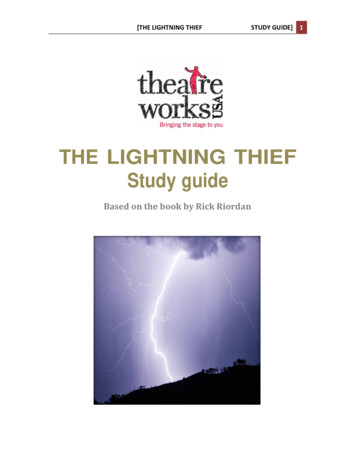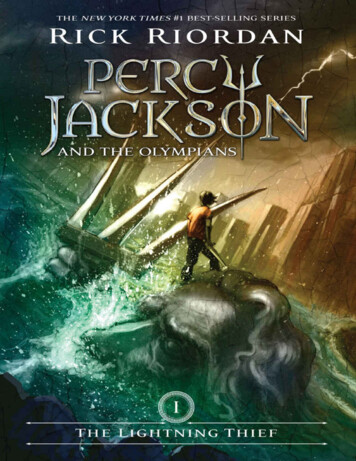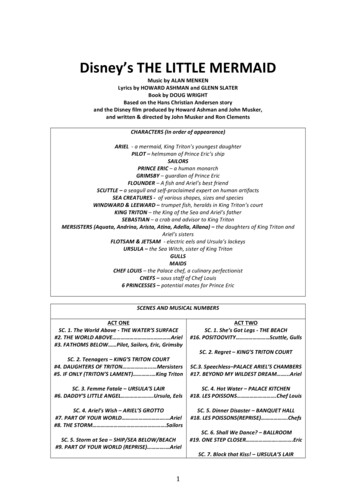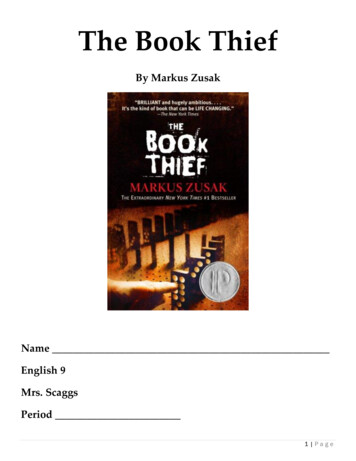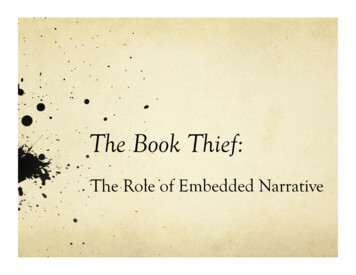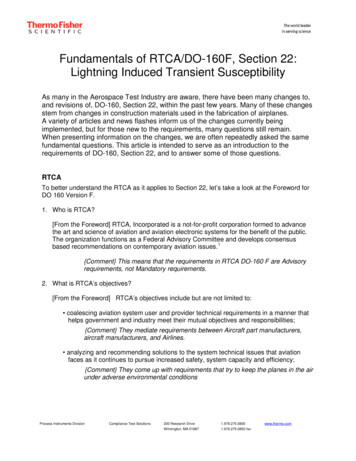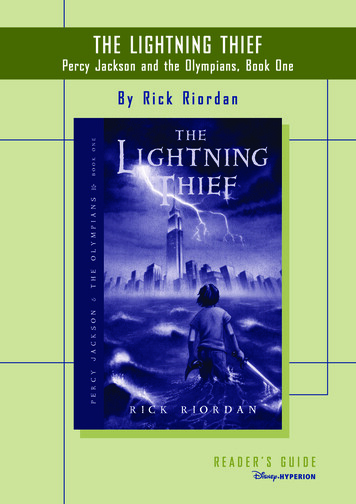
Transcription
THE LIGHTNING THIEFPercy Jackson and the Olympians, Book OneBy Rick RiordanREADER’S GUIDEd HYPERION
When 12-year-old Percy Jackson learns that his true father is Poseidon,the Greek god of the sea, he undertakes a dangerous quest across theUnited States to retrieve a stolen lightning bolt and stop a war betweenthe gods. The Lightning Thief provides a high-interest, humorousintroduction to the Greek myths. It encourages young readers toexplore elements of the classical hero’s quest rendered in a modernday setting, and to discuss such relevant issues as learning disabilities,the nature of family, and themes of loyalty, friendship and faith.
TABLE OF CONTENTSPLOT SUMMARY2GREEK MYTHOLOGY6DISCUSSION QUESTIONS12CLASSROOM ACTIVITIES16ABOUT THE AUTHOR20REFERENCE RESOURCES23
PLOT SUMMARYDuring a field trip to the Metropolitan Museum of Art, Percy Jacksonbegins to suspect that his life is not what it seems when his math teachertransforms into a Fury and attacks him. Percy manages to vaporize themonster with an ancient bronze sword, but afterwards he wonders ifthe incident was a hallucination. Everyone, including Percy’s best friendGrover, claims that the math teacher who attacked him never existed.At the end of the year, Grover insists on escorting Percy home fromboarding school. Grover’s nervousness and cryptic comments about Percybeing in danger make Percy uneasy.Percy’s home life is far from perfect. His mother Sally Jackson is a kindwoman who never had any luck in life. She dreams of being a writer, butworks at a candy shop to make ends meet and is married to “Smelly” GabeUgliano, Percy’s abusive stepfather, who expects Percy to provide him withpoker-playing money in exchange for room and board. Percy struggles tounderstand why his mother, who obviously loves him, takes such pains tosend him away every year to a different boarding school.When Percy and his mother go for a weekend retreat to the beach, theirtime together is interrupted by a storm and a horrible wailing in themiddle of the night. Percy’s friend, Grover, appears at their door andreveals himself as a satyr. He has been keeping an eye on Percy until Percyis old enough to attend Camp Half Blood, a summer camp for trainingdemigods. Grover tells Percy that monstrous forces are now after him inearnest, and they have no choice but to flee to Camp Half Blood.On the way, they are attacked by the Minotaur. Percy defeats the monster,but not before it knocks out Grover and squeezes Percy’s mother until shedisappears in a shower of gold. Heartbroken, assuming his mother is dead,Percy pulls Grover to safety over the property line of Camp Half Blood.Once at camp, Percy is reunited with his Latin teacher, who in his trueform is Chiron, the immortal centaur and trainer of heroes. Percy learnsthat the Greek gods are alive and well—an integral part of the collectiveconsciousness called Western Civilization. Olympus, the home of the2
gods, moves with the heart of the civilization, and now hovers invisiblyover the Empire State Building, since America is currently the greatpower of the West. Percy learns that the gods still have children withmortals, and that monsters naturally seek out these young demigods.Camp Half Blood serves as a safe haven where these powerful,endangered young heroes can train to defend themselves. For the pastsixty years, the “big three” (Zeus, Poseidon, and Hades) have kept anoath not to have mortal children because their powerful nature can causegreat trouble in the world, but the other Olympians still have enoughchildren to fill the camp. Percy meets Annabeth, a daughter of Athena,and Luke, a son of Hermes. He also makes a new enemy in Clarisse, adaughter of Ares. Percy’s own parentage remains undetermined untila swirling trident appears above him during a Greek-battle–style gameof capture the flag. To the astonishment of the other campers, Percyis recognized as a son of Poseidon—the first in three generations.Soon after this revelation, Percy learns that there is trouble in Olympus.Zeus’s master bolt—the weapon upon which all other lightning boltsare modeled—has been stolen, and Zeus has accused Poseidon ofinstigating the theft. The lord of the sky believes that Poseidon usedPercy, a human hero, to steal the bolt in a plot to overthrow Zeus. Zeushas given Poseidon until summer solstice—only ten days—to returnthe weapon. Poseidon is offended, but he also dreads the thought ofwar with Zeus. He needs Percy’s help to find out what really happenedto the bolt. Chiron believes that Hades, lord of the underworld, stolethe bolt to set his two brothers at each other’s throats. Chiron tellsPercy that he must travel to the entrance of the underworld in LosAngeles (by land, since Zeus would blast him out of the sky if he triedto fly), confront Hades, and return the master bolt to Olympus beforethe solstice passes in order to prevent a war between the gods.As is customary, Percy consults the Oracle before leaving. He is warnedthat he will fail to save what matters most in the end, and will bebetrayed by a friend. Deeply troubled, but believing that the quest to theunderworld is the only way to see his mother again, Percy sets out withtwo companions, Annabeth and Grover.3
PLOT SUMMARYAlong the way, the three friends learn to trust one another. Annabeth,whose mother Athena is an old rival of Poseidon, must overcome herdoubts about Percy. Grover the satyr must overcome his fear of monstersand underground places. Only by showing courage can Grover convincethe Council of Cloven Elders to grant him his life-long goal of a “searcher’slicense,” giving him the right to quest for the missing god of thewilderness, Pan. Percy comes to terms with his anger toward his father,who has suddenly declared himself after ignoring Percy for twelve years.In his travels west, Percy encounters Medusa, the Chimera, Procrustes theStretcher, and the Lotus Hotel and Casino (the Land of the Lotus Eaters).He also meets the war god Ares, who gives Percy a mysterious backpackin exchange for doing the god a favor, and a Nereid, who gives Percy threemagic pearls from Poseidon—each of which will return one person to thesea from wherever they may be, even the land of the dead.The friends finally arrive in the underworld only to discover that theyhave been tricked. The culprit is not Hades, but the defeated Titan, Kronos,who is trapped in the depths of Tartarus but is still able to manipulatethe dreams of gods and men. Hoping to start a three-way war betweenhis Olympian sons, Kronos caused the master bolt and also Hades’s helmof darkness to be stolen by a human hero whose identity Percy does notyet know. Kronos’s human thief was unexpectedly captured by Ares. Thewar god meant to keep the magic items for himself, but Kronos bent hiswill and caused the god to give the master bolt to Percy, hidden within themagic backpack, so that the young hero might bring it to the underworldfor Kronos.Hades is sure Percy is the thief who stole the bolt and his helm. The godof the dead is holding Percy’s mother—who is only frozen in a shower ofgold, not dead—and demands Percy give up the magic helm before she isreleased. As armies of the dead surround him, Percy brings out his magicpearls. With only three, he realizes he must choose between the livesof his two friends and saving his mother. In the end, he can’t abandonhis friends. Promising his mother that he will return for her, Percy andhis friends escape to the surface, where Percy battles the god Ares for4
possession of the bolt and the helm. Percy wins, gives the helm to theFuries to return to the underworld, and travels back to New York withthe bolt in time to prevent a war.At Olympus, Percy meets his father face to face. Poseidon seems distantand sad, but says he is proud of his son. He says he fears Percy has beenborn for a hero’s tragic fate. Poseidon tells Percy that his mother is back—returned as a peace offering by Hades—and that when Percy returnshome, he will have to make an important choice. Percy rushes back tohis family’s apartment, where he finds Medusa’s head waiting for him,a trophy he had forgotten mailing home earlier in his quest. He realizeshe has the chance to petrify his stepfather and save his mother from amiserable marriage. His mother implores him not to do it, however. Shemust break away from Gabe herself. Percy respects her wishes, and thusbreaks the mold of what the tragic hero might have done. The prophecythus comes true in an unexpected way: Percy fails to save what mattersmost by allowing his mother to save herself.Upon returning to Camp Half Blood, Percy is betrayed by his friend Luke,son of Hermes, who turns out to be the human hero whom Kronos used forthe theft. Luke poisons Percy, and tells him before leaving that Kronos willrise and destroy the age of the gods. Western Civilization is unraveling.Percy recovers from the poison with Chiron’s help and realizes hisadventures are not yet over. He is a hero now and must fight the rise ofthe Titans.The novel is ultimately about Percy coming of age, learning to trust hisfriends and his own abilities, accepting his parents for who they are, andchoosing love and loyalty over resentment and despair.5
GREEK MYTHOLOGYThe Lightning Thief immerses readers in the world of Greek mythology.Below are some key mythological characters referenced in the novel.The Twelve Olympian GodsZeus: Lord of the sky, chief god of the Olympians. He led the revolt againsthis father, the Titan, Kronos. His main weapon is the lightning bolt. Hissymbol is the eagle. Zeus is married to Hera but has had numerous affairswith other goddesses and mortal women. His demigod children includePerseus and Heracles (Hercules).Hera: Goddess of marriage and motherhood. The wife of Zeus and also hissister, Hera is a jealous goddess who resents her husband’s unfaithfulness.Hera helps some heroes, like Jason, but was the enemy to others, namelyHeracles (Hercules). Her symbols are the cow (the most motherly animal)and the colorful peacock.Poseidon: God of the sea, Zeus’s brother. Poseidon is a changeable god, likethe ocean itself, sometimes violent, sometimes calm. He created horses fromsea foam and like his brother Zeus has had many affairs with goddessesand mortal women. Theseus was his most famous demigod son. Poseidon’ssymbol is the trident, which he uses to stir up terrible storms at sea.Demeter: Goddess of agriculture, sister of Hera and Zeus. The mostfamous story about Demeter tells how her daughter Persephone wascaptured by Hades and taken to the underworld. Demeter and Hadesfinally worked out an agreement by which Persephone would spend halfthe year with her mother and half the year with her new husband Hades.Demeter would only allow crops to grow during the time Persephone waswith her. Thus the seasons were created.Ares: God of war, Ares is the proud and cruel son of Zeus and Hera. Heloves battle, but despite his strength he is not a smart tactician. At heart, heis a coward, like most bullies. His symbol is the wild boar and his favoriteweapon is the spear. He is Aphrodite’s lover.6
Athena: Goddess of war, wisdom, and useful crafts. The patron goddess ofAthens, from whom the city got its name. Athena sprang from Zeus’s head,which Hephaestus had to split open to relieve the god’s headache. Athenainvented many things, including the chariot and the loom. She grantedmankind the olive tree. One of the most popular goddesses, she oftenhelps heroes who use their brains, like Odysseus. She dislikes Poseidonand Ares. Her symbols are the owl, the olive tree, and the aegis, a specialshield upon which is mounted the head of Medusa.Apollo: God of archery, divination, and the arts. Later, Apollo was alsoassociated with the sun. Handsome and talented, Apollo is the twin brotherof Artemis. He is the patron of archers, and created music. He slew thegreat Python, and became the force behind the Oracle at Delphi, whichcould tell the future. There were other oracles, but the one at Delphi was themost famous. The Oracle often spoke in riddles which were not clear untilafter events came to pass. Apollo’s symbols are the lyre, the laurel tree, andthe mouse (an animal which ran everywhere and overheard many secrets).Artemis: Goddess of the hunt and the moon. Artemis vowed to always be amaiden. Because of this, her followers tended to be young unmarried girlswho shunned men. A great archer and hunter, Artemis roams the wilds ofthe world with a band of maidens. Her symbols are the deer and the bow.Hephaestus: God of fire and blacksmithing. As a baby, Hephaestus wasthrown from Olympus by his father Zeus. Because of this, he grew upugly and crippled, but was extremely good at working with his hands.He can make anything out of metal. He was given Aphrodite as his bride,because Hera thought it would help Aphrodite settle down. Unfortunately,Aphrodite has affairs behind her husband’s back, and Hephaestus isalways trying to catch his wife with her lovers.Aphrodite: The goddess of love, who was born from sea foam. She is themost beautiful goddess, and very vain. She has a magic girdle (belt) whichcan cause anyone to fall in love with her. Though married to Hephaestus,her main boyfriend is Ares. Her symbol is the dove.7
GREEK MYTHOLOGYHermes: The god of merchants, travelers, thieves, and medicine. Hermeswatches over all who use the roads and are involved in commerce. Theson of Zeus, Hermes could talk when he was only a baby and once stolecattle from Apollo. He made up for this by giving Apollo the lyre, whichbaby Hermes invented. Hermes uses his speedy winged sandals to delivermessages for the gods. He carries a caduceus, a winged staff entwinedwith serpents, which today is the symbol of medicine.Dionysus: The god of wine. Dionysus was born a mortal, but Zeus grantedhim immortality when he invented wine. Dionysus once led a drunkenarmy to India, where he captured some tigers. He once turned a boatloadof sailors into dolphins because
THE LIGHTNING THIEF Percy Jackson and the Olympians, Book One By Rick Riordan d. When 12-year-old Percy Jackson learns that his true father is Poseidon, the Greek god of the sea, he undertakes a dangerous quest across the United States to retrieve a stolen lightning bolt and stop a war between the gods. The Lightning Thief provides a high-interest, humorous introduction to the Greek myths. It .

